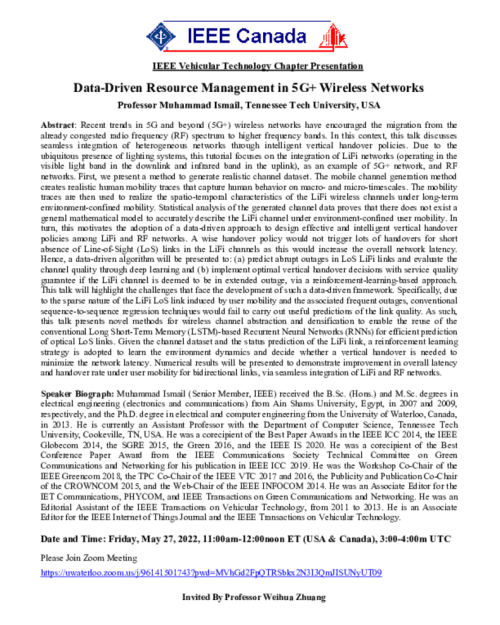Chapter Seminar: Data-Driven Resource Management in 5G+ Wireless Networks

Event Menu
All VTS members are invited to attend Data-Driven Resource Management in 5G+ Wireless Networks, hosted by the IEEE Kitchener-Waterloo Chapter, on Friday, May 27, 2022, 11:00am-12:00noon ET (USA & Canada), 3:00-4:00pm UTC.
Abstract:
Recent trends in 5G and beyond (5G+) wireless networks have encouraged the migration from the already congested radio frequency (RF) spectrum to higher frequency bands. In this context, this talk discusses seamless integration of heterogeneous networks through intelligent vertical handover policies. Due to the ubiquitous presence of lighting systems, this tutorial focuses on the integration of LiFi networks (operating in the visible light band in the downlink and infrared band in the uplink), as an example of 5G+ network, and RF networks.
First, we present a method to generate realistic channel dataset. The mobile channel generation method creates realistic human mobility traces that capture human behavior on macro- and micro-timescales. The mobility traces are then used to realize the spatio-temporal characteristics of the LiFi wireless channels under long-term environment-confined mobility. Statistical analysis of the generated channel data proves that there does not exist a general mathematical model to accurately describe the LiFi channel under environment-confined user mobility. In turn, this motivates the adoption of a data-driven approach to design effective and intelligent vertical handover policies among LiFi and RF networks. A wise handover policy would not trigger lots of handovers for short absence of Line-of-Sight (LoS) links in the LiFi channels as this would increase the overall network latency.
Hence, a data-driven algorithm will be presented to:
(a) predict abrupt outages in LoS LiFi links and evaluate the channel quality through deep learning
(b) implement optimal vertical handover decisions with service quality guarantee if the LiFi channel is deemed to be in extended outage, via a reinforcement-learning-based approach.
This talk will highlight the challenges that face the development of such a data-driven framework. Specifically, due to the sparse nature of the LiFi LoS link induced by user mobility and the associated frequent outages, conventional sequence-to-sequence regression techniques would fail to carry out useful predictions of the link quality. As such, this talk presents novel methods for wireless channel abstraction and densification to enable the reuse of the conventional Long Short-Term Memory (LSTM)-based Recurrent Neural Networks (RNNs) for efficient prediction of optical LoS links. Given the channel dataset and the status prediction of the LiFi link, a reinforcement learning strategy is adopted to learn the environment dynamics and decide whether a vertical handover is needed to minimize the network latency. Numerical results will be presented to demonstrate improvement in overall latency and handover rate under user mobility for bidirectional links, via seamless integration of LiFi and RF networks.
Speaker Biography:
Muhammad Ismail (Senior Member, IEEE) received the B.Sc. (Hons.) and M.Sc. degrees in electrical engineering (electronics and communications) from Ain Shams University, Egypt, in 2007 and 2009, respectively, and the Ph.D. degree in electrical and computer engineering from the University of Waterloo, Canada, in 2013. He is currently an Assistant Professor with the Department of Computer Science, Tennessee Tech University, Cookeville, TN, USA. He was a corecipient of the Best Paper Awards in the IEEE ICC 2014, the IEEE Globecom 2014, the SGRE 2015, the Green 2016, and the IEEE IS 2020. He was a corecipient of the Best Conference Paper Award from the IEEE Communications Society Technical Committee on Green Communications and Networking for his publication in IEEE ICC 2019. He was the Workshop Co-Chair of the IEEE Greencom 2018, the TPC Co-Chair of the IEEE VTC 2017 and 2016, the Publicity and Publication Co-Chair of the CROWNCOM 2015, and the Web-Chair of the IEEE INFOCOM 2014. He was an Associate Editor for the IET Communications, PHYCOM, and IEEE Transactions on Green Communications and Networking. He was an Editorial Assistant of the IEEE Transactions on Vehicular Technology, from 2011 to 2013. He is an Associate Editor for the IEEE Internet of Things Journal and the IEEE Transactions on Vehicular Technology.
